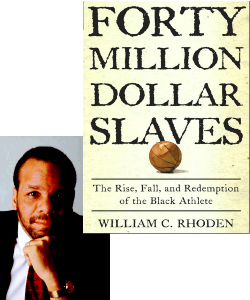BOOK REVIEW: Forty Million Dollar Slaves: The Rise, Fall, and Redemption of the Black Athlete. By William C. Rhoden

-- Excerpted from Chapter 7, The Conveyor Belt
Once upon a time, prominent African-American athletes were inclined to leverage their fame as a means of confronting racism. From Paul Robeson to Jackie Robinson to Muhammad Ali to Jim Brown to Arthur Ashe to Olympic medal-winners Tommie Smith and John Carlos, there is an abundant legacy of commitment to the black community.
But judging by today’s socially unenlightened crop of sports icons, one might suspect that rich history of activism and advocating for the underclass to be more fairy tale than fact. The once-widespread dedication to hard-fought, collective advancement has been all but abandoned by the current generation of superstars, at least according to William C. Rhoden, author of Forty Million Dollar Slaves: The Rise, Fall, and Redemption of the Black Athlete.
The tone of today’s ballplayer is perhaps typified by the NBA’s Grant Hill, who acknowledges that “When you’re making $200,000 every two weeks, it’s hard to get angry about anything.” Rhoden, a sportswriter for The New York Times since 1983, concedes that most pros now make more money in one season than his childhood heroes could accumulate over the course of their entire careers. However, he also argues that these financial rewards ought to translate into an even more effective advocacy bloc for African-American advancement.
Instead, we have entered the age of the apolitical mega-star, carefully packaged products such as Michael Jordan, who Rhoden says went to great lengths to cultivate a non-threatening, ever-neutral public image. The author points out that Jordan was a ferocious competitor of unparalleled drive on the court and in the corporate world, but not “when it came to confronting racism.”
Insights such as this are what make Forty Million Dollar Slaves a priceless and prophetic discourse on the path of blacks in sports, dividing its time between African-American history and the present-day dilemma where we find individualism, commercialism, materialism and blasé attitudes celebrated at the expense of any concern about a black agenda. Also of interest is how the book, posthumously, gives credence to most of the notions which cost the late Jimmy the Greek his job when he related anecdotes about antebellum plantation owners breeding slaves for muscularity. Now we learn that blacks did dominate the field back then, whether in horseracing as the country’s first jockeys or in track as sprinters at events staged to entertain white spectators.
Perhaps most significantly, it asks some very meaningful questions about franchise ownership, pointing out that the integration of baseball simultaneously signalled the demise of the black-owned Negro League. For a while, Brooklyn Dodger owner Branch Rickey has invariably been hailed for having signed Jackie Robinson; here, he is blamed for helping keep black competitors out of the big leagues, rationalizing preserving a white monopoly with “There is no Negro League as far as I’m concerned.”
Overall, Forty Million Dollar Slaves still offers an optimistic message since thousands of black athletes are now blessed with the means to make major statements about the way their industry is run, provided they remember their roots and somehow develop the wherewithal and inclination to get involved. Nonetheless, such salvation is not guaranteed since, as the Bible states in Proverbs 29: 18: “Where there is no vision, the people perish.”



